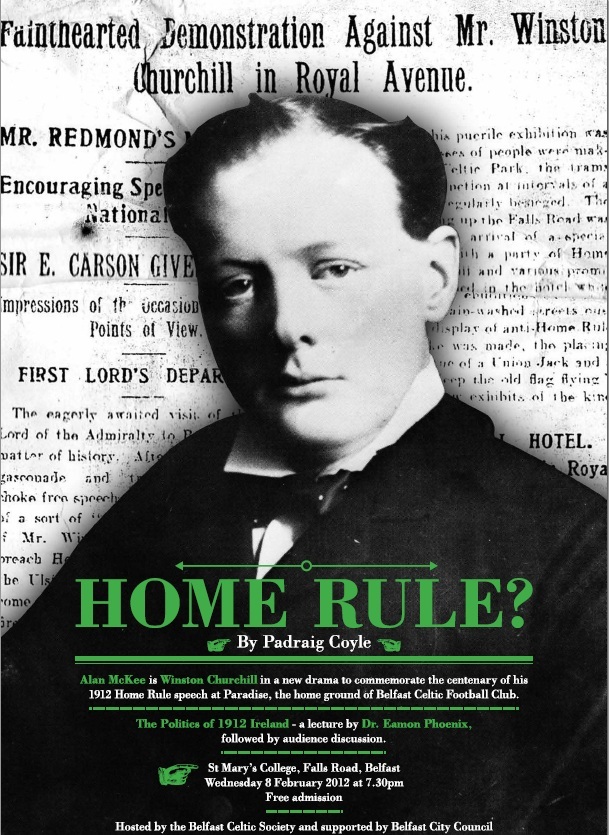Mr Churchill goes to Belfast, 8 February 1912
Published in Decade of Centenaries On 9 February 1912 the Belfast News-letter reported that ‘yesterday the Right Honourable Winston Churchill, the First Lord of the Admiralty, paid his much discussed visit to Belfast, and, in company with Mr Redmond and Mr Devlin, addressed a Home Rule meeting in the Celtic Park grounds under the presidency of Lord Pirrie K.P. Without any exaggeration it might be described as a flying visit, for Mr Churchill, who had at first purposed to give us two days of his valuable time, only spent seven and a half hours in the city, including the hours passed at the meeting. He journeyed from London via Stranraer and Larne, and evidently the reception accorded to him in Belfast did not encourage him to tarry longer then was absolutely necessary’.
On 9 February 1912 the Belfast News-letter reported that ‘yesterday the Right Honourable Winston Churchill, the First Lord of the Admiralty, paid his much discussed visit to Belfast, and, in company with Mr Redmond and Mr Devlin, addressed a Home Rule meeting in the Celtic Park grounds under the presidency of Lord Pirrie K.P. Without any exaggeration it might be described as a flying visit, for Mr Churchill, who had at first purposed to give us two days of his valuable time, only spent seven and a half hours in the city, including the hours passed at the meeting. He journeyed from London via Stranraer and Larne, and evidently the reception accorded to him in Belfast did not encourage him to tarry longer then was absolutely necessary’.
Churchill came to Belfast to give a speech in favour of Home Rule at the Ulster Hall: the same venue where, in 1886, his father Randolph had made his notorious comment that ‘Ulster will fight, and Ulster will be right’ (a phrase that his son cheekily alluded to in the speech he eventually gave). But that speech was moved to Celtic Park on the Donegall Road (the home ground of Belfast Celtic) after local unionists physically blocked the use of the Ulster Hall. Churchill had been jeered on his arrival at Larne earlier that day, an attempt was made to jostle his car (which was pelted with missiles), and there was a heavy police and army presence in Belfast in anticipation of major unionist protests.
The Irish Independent estimated that 7,000 were present in Celtic Park on a very rainy day. The meeting was presided over by Lord Pirrie (William Pirrie, the chairman of Harland & Wolff and a convert to Home Rule). Churchill shared the platform with John Redmond and Joe Devlin as he assured a cheering crowd that a Home Rule Bill was imminent. He set forth a vision of Home Rule fixed firmly within the empire; indeed, he argued, the Irish were ‘by character and tradition attached to monarchical institutions’. He gave a vague outline of the provisions of the bill, such as protection for minorities and a degree of fiscal control, but Churchill was adamant that separation was not on the agenda, and that the prospective Irish parliament would not be permitted to go beyond the limits set down in the bill. His speech was applauded by Redmond and Devlin, who may have been less enthusiastic had they known that two days beforehand, Churchill had supported a proposal to exclude Ulster from any Home Rule arrangement that was tabled at a cabinet meeting by David Lloyd George.
According to The Irish Times (9 Feb 1912), after the meeting broke up ‘Mr Churchill drove in his motor for the York road terminus, and took a special train to Larne, where he embarked on the Stranraer steamer’. The attitude of local unionists had not gotten any friendlier. Later, ‘the streets of Belfast were paraded…by crowds cheering for the unionist leaders, and Sir Edward Carson addressed them from the balcony of the Ulster Club. He said if Mr Churchill had persisted in holding this meeting in the Ulster Hall he did not know what would have happened. If it became necessary to take strong action, the unionists were ready to do so. They would never under any circumstances have Home Rule. They would fight every square inch of the ground, and would strike like one man. May God give them strength to defeat the nefarious policy of Home Rule’.
Carson’s willingness to utter such threats, however veiled, was viewed uneasily by southern unionists: it was also a very public indication that the inclusion (or otherwise) of Ulster was to be the issue that would define the campaign for the third Home Rule bill. If nothing else, Churchill’s visit to Belfast had, as the Irish Times put it, made clear ‘facts which the radical and nationalist leadership were desperately anxious to conceal’.
John Gibney
















